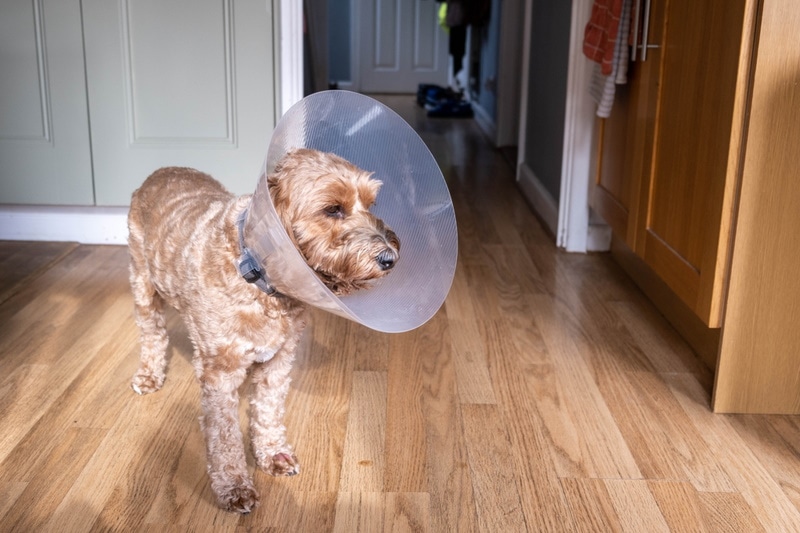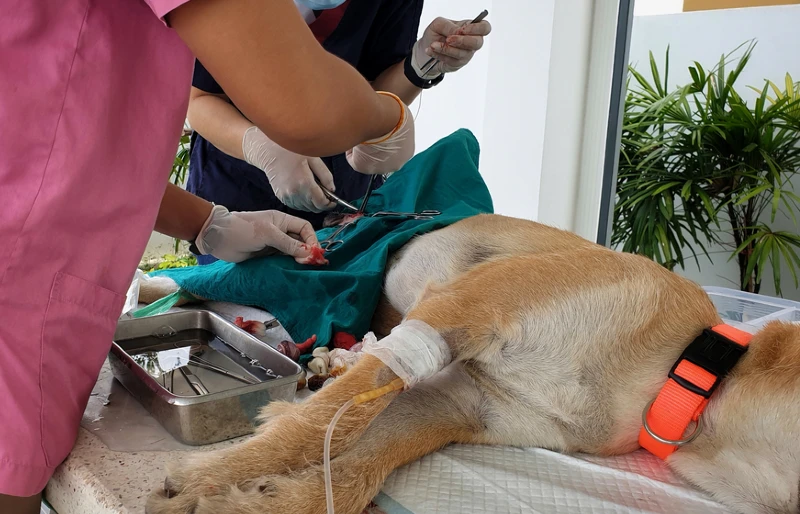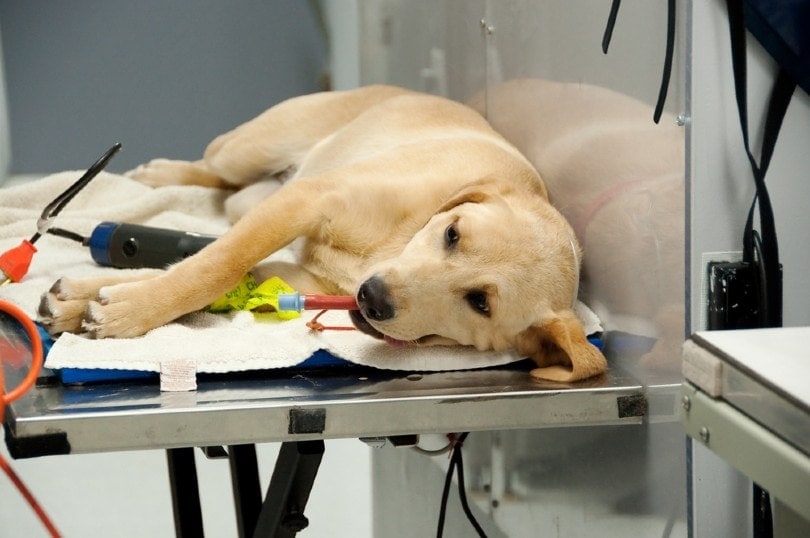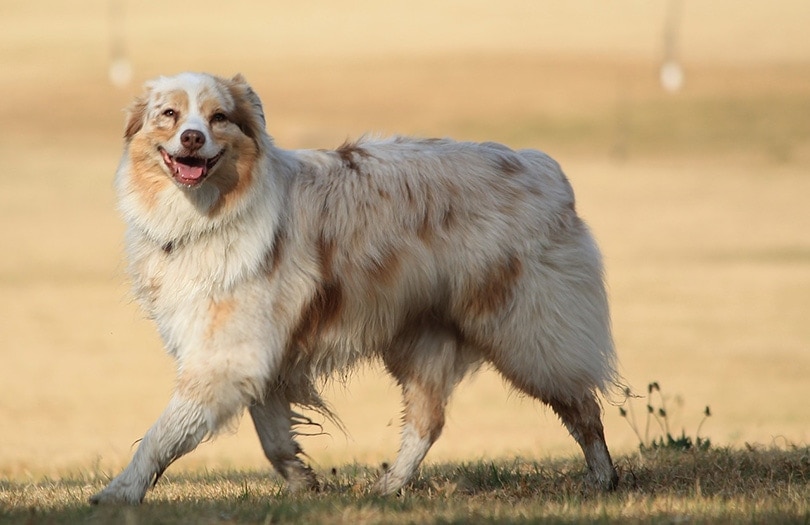Does Neutering a Dog Change Their Personality? Vet-Approved Facts
Updated on

It’s a common belief that neutering a male dog will change his personality. This is not always true, but certain changes occur after neutering that do influence behavior to an extent. Neutering reduces or outright stops some undesirable behaviors, like running away to find mates, territorial marking, and testosterone-fueled dominance. As a result, a previously aggressive dog that frequently marks his territory may appear more easygoing and relaxed. Neutering used to be advised for all aggressive dogs to reduce this unwanted behavior, but more recently it has been found that success in reducing aggressive behavior by neutering depends on the cause and type of aggression being demonstrated. Aggression, dominance and confidence can be linked to testosterone, so removing the source of testosterone can influence your dog’s behavior to an extent.
If you’ve ever wondered about the benefits of neutering your dog, its side effects, or when to consider it for your dog, you’re in the right place. Join us below as we dive into all those topics so you can have a better understanding with which to make a more informed decision.
Does Neutering a Dog Have Side Effects? Risks Explained
Neutering a male dog is considered a routine medical procedure for the average healthy dog, and in most cases, there aren’t any major side effects to speak of. This is still a surgery, though, which inherently comes with some risks. Spaying a female dog is a more involved procedure and recovery time is usually longer. There are also more inherent risks with a female spay, but it is still considered a routine surgery. There are also certain breeds and disease processes that need to be mentioned separately.
- Depressive behavior: Low-energy and sleepiness are common post-surgical signs that will resolve with time. If you think your dog is not responding normally or is more sleepy than you expected, you should contact your vet. Sleepiness is normally a side effect of the anesthetic and should wear off within 24 hours.
- Reduced metabolism: Dogs may appear less energetic and want to eat more food after they’ve been neutered. It is not true that neutered dogs always put on weight. They will only put on weight if they are overfed or under-exercised; owners need to be mindful of this and not feed their dog’s increased appetite.
- Increased risk of joint conditions: It’s unclear why, but in some larger dog breeds, spaying/neutering early in life (before 1 year of age) can increase the likelihood of developing painful joint conditions.1
- Increased likelihood of some cancers in some breeds: Neutered male Golden Retrievers are more likely to develop bone cancer, if neutered before the age of 1, and the risks of prostate cancer are higher in neutered dogs.2
Benefits of Neutering Your Dog

One important reason to neuter a dog is to stop it from reproducing. Neutering a dog means they lose both their ability to reproduce and their drive to reproduce. However, there are actually a few other notable health and behavioral benefits you may notice after getting your dog neutered. Let’s look at a few of those benefits so you can determine if it’s worth it for your dog.
- Decreased risk of some cancer: Desexing removes the risk of testicular cancers in male dogs and reduces the risk of benign prostatic hyperplasia (non-cancerous growth of the prostate). In female dogs, neutering removes the risk of ovarian and uterine cancers, as well as reduces the likelihood of mammary cancers.
- Reduced aggression: Dominant male dogs will become more agreeable and less likely to fight other males or compete for a female dog’s attention. If aggression is due to nervousness, it is not recommended that male dogs are neutered until their behavior is improved through training.
- No reproductive drive: Desexed male and female dogs will lose their urge to run away and find a mate, keeping them safe at home and much less likely to be involved in road traffic accidents or fights.
When to Desex Your Dog

Dogs can be spayed or neutered at 6 to 9 months, but you may be wondering whether it’s really advisable to have the procedure done at that point. The longer answer is that it depends on your dog’s breed and behavior. Smaller breeds can benefit from being spayed or neutered at a younger age. To be specific, toy breeds, such as the Yorkshire Terrier, can be desexed at 6 months with few long-term effects. The increased cancer risks associated with neutering (mentioned above) seem to only be the case in larger breeds of dog.
Larger dogs may need more time to mature before they can safely be desexed without adverse risks to their health. We suggest waiting until 18 months before desexing large or giant dog breeds to help mitigate the risk of them developing orthopedic conditions. Simply put, their bone growth and health is impacted by the sex hormones so ideally, you want to wait until they’re fully grown to minimize the risk of complications.
Before you make the decision to have your dog neutered, we strongly recommend you do some research on your dog’s breed and discuss their potential for developing health conditions with your vet. They’ll be able to help you evaluate the risk of neutering and advise you on current research to help decide whether it’s worth it for your dog at this time.
You should only get advice from qualified vets on this subject as there is a lot of conflicting advice on the internet about it.
Conclusion
Neutering a dog can change its personality to an extent, but this is usually for the better, especially in the case of unwanted behaviors. Some dogs are more at risk of developing serious health problems like cancer after neutering, so we urge you to talk to your vet for more personalized advice on this topic.
Featured Image Credit: Robyn-May, Shutterstock













